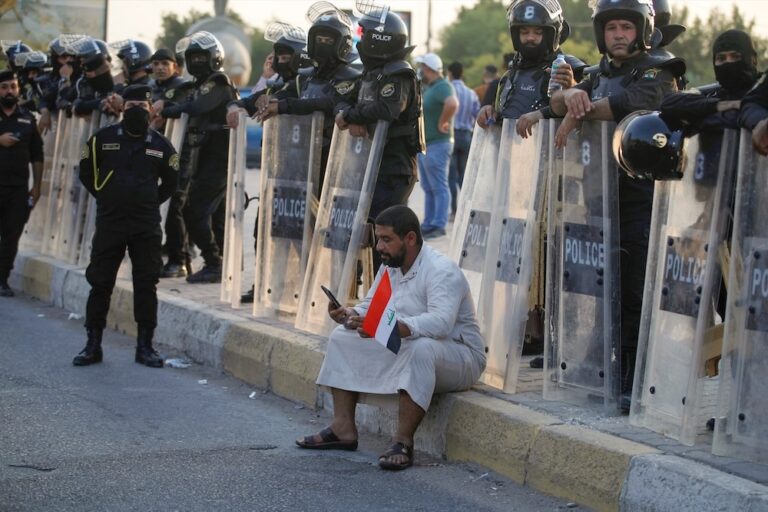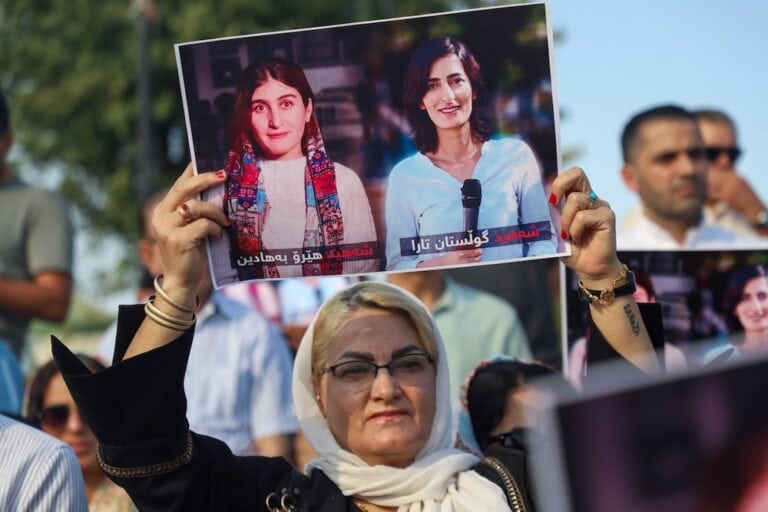Journalists described it as the most harrowing period since the US invasion of Iraq in April 2003.
(RSF/IFEX) – Political rivalry and tension prompted by the 7 March 2010 legislative elections in Iraqi Kurdistan resulted in a wave of violence against independent and opposition journalists in the days preceding the election and on election day itself. Journalists describe it as the most harrowing period since the US invasion of Iraq in April 2003.
“I am really concerned about these press freedom violations, which were too many to count,” said Halgurd Samad, the editor of “Livin”, Iraqi Kurdistan’s leading magazine.
“There was no justification for all these attacks. We want to help the authorities to combat corruption and establish the rule of law, but they want us to stop criticizing. They attack us because they fear our power, they fear that our coverage of corruption could fuel opposition.”
Referring to the Kurdistan Democratic Party and Patriotic Union of Kurdistan, the two parties that have until now controlled the Kurdistan Regional Government, Samad added: “The KDP and the PUK target us because our reporting worries them. The independent media are the only ones able to expose the corruption, the power games and the political deals.”
Zirak Kamal, from the Union of Kurdistan Journalists and a media adviser to Kurdistan’s prime minister, Dr. Barham Saleh, also criticised the use of threats and violence against the media even if he insisted that the authorities were doing all they could to rein it in. “We ask all the journalists to file complaints in the courts,” he said. “We are ready to do our best to help them. The courts are independent and everyone should respect their decisions.”
Kamal added: “The prime minister believes that independent media are needed to protect our democracy and national security. We are aware of the recent incidents and we have decided to ask the interior ministry to investigate them and identity those responsible for the attacks.”
Election Day – 7 March
Polling day was a black day for press freedom with many physical attacks and threats against independent and opposition media. Reporters Without Borders is aware of the following cases:
Kawa Garmiyani, the newspaper “Awene”‘s reporter in the city of Kalar, in Sulaymaniyah province, was beaten by security forces and prevented from taking photos.
In Halabja district, in Sulaymaniyah province, a reporter for the opposition TV station KNN was attacked by security forces while filming PUK polling violations.
Independent and opposition journalists were prevented from entering voting stations or taking photos of them although the Independent High Electoral Commission (IHEC) had said all journalists had the right to do this.
Residents helped Rabar Uzer, a reporter for the official website of the opposition Kurdistan Islamic Union/Yekgirtu ( http://www.kurdiu.org ), to escape when PUK security forces tried to confiscate his camera and beat him in the city of Sulaymaniyah.
Akar Fars and Rzgar Muhsin, two journalists working for Yekgirtu’s TV station in the Kurdish capital of Erbil, were attacked and badly beaten by security forces, who took their camera, defaced the station’s logo and detained them for 20 minutes.
Ibrahim Ali, Livin’s correspondent in Erbil, was prevented from taking photos although he had press ID that had been approved by the IHEC.
Hemn Mamand, Awene’s reporter in Erbil, received a threatening phone call from an unidentified phone number.
Shwan Sidiq, a reporter for the magazine “Civil”, was attacked by police in Erbil. “While I was busy taking photos, security forces accosted me, roughed me up and took my camera,” he told Reporters Without Borders.
Journalists working for Yekgirtu-owned Speda TV in Bazyan (a district of Kalar) were attacked by PUK security forces.
Security forces harassed the journalists accompanying Salahadin Bahadin, the head of Yekgirtu, when he went to vote. Bahadin issued a statement condemning the violence.
Rudaw’s reporter Ari Othman was attacked and injured in Erbil by a group of men in civilian dress.
Anwar Sabah, a reporter for the satellite TV station Payam, was prevented from filming election-day incidents in Erbil.
Click here for details on incidents during the run-up to the elections


